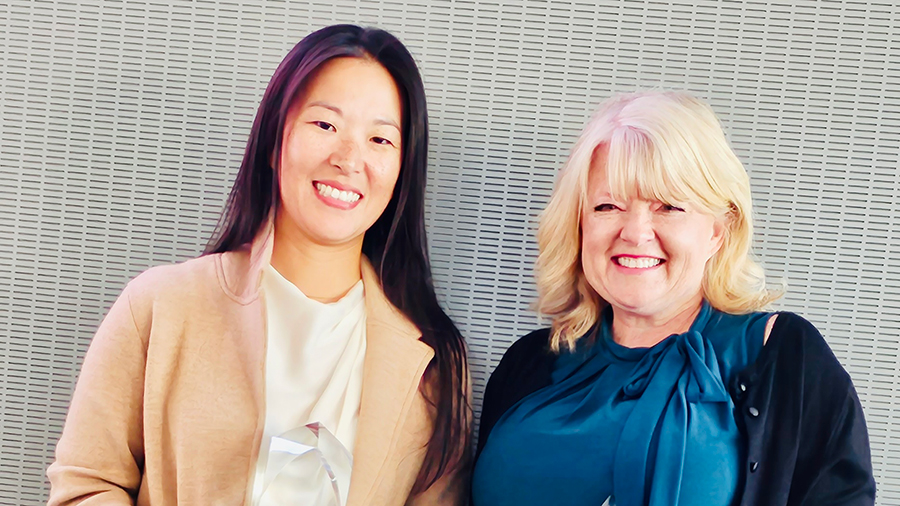
Leading By Example
ANA nonprofit award winners Tracey Burgoon and Amy Bobrick on their paths to success and sector concerns
Every year, the ANA Nonprofit Federation recognizes outstanding achievements in the nonprofit sector. Honors include the Max Hart Nonprofit Achievement Award, which recognizes outstanding career accomplishments by a fundraising professional, and the ANA Nonprofit Federation Rising Leader Award, which celebrates the next generation of nonprofit marketing and fundraising leaders.
This year’s winners represent the highest levels of achievement and dedication, and took very different paths on their journeys. Tracey Burgoon, chief development officer at ANA member Disabled American Veterans (DAV) and winner of the Max Hart Award, has been with the organization for more than 25 years, starting as director of direct marketing. On the other hand, Amy Bobrick, recipient of the Rising Leader Award, honed her craft at a variety of fundraising agencies before becoming VP of decision science and strategy at ANA member ABD Direct.

The ANA Nonprofit Federation honored Amy Bobrick of ABD Direct (left) and Tracey Burgoon of the DAV (right) for their significant contributions to nonprofit marketing.
This Q&A was written by Anne Field for the ANA Magazine, and first published on January 22, 2024. Link to the original story here.
ANA magazine talked to Burgoon and Bobrick about their views on donor engagement, data privacy, and how they got to where they are today.
Q. What led you to the sector or your organization, and what makes you stay?
Tracey Burgoon: I started working in direct marketing when I was in college and had a couple of nonprofit accounts, including DAV. Eventually they offered me a job. But the organization has always been a big part of my life. My dad is a disabled veteran and member of DAV, so is my husband, and so is my son.
When I was younger, DAV was the organization my dad belonged to. Then my son decided to go into the military. I could see that he was affected by PTSD while he was still there, but he was afraid to ask for help. My peers at DAV gave me advice about what he should do. So I know first-hand what DAV is accomplishing for our service members.
In addition, we continually adapt to the current climate. We’re now creating programs not just for veterans, but for their family members, too. This year we launched a caregivers’ support group. And we’re helping veterans become entrepreneurs with an entrepreneurial boot camp.
Amy Bobrick: It wasn’t a direct path. I graduated college in 2008, into a hard market, and got a job at the United States Navy Memorial and then the National Foundation for Cancer Research (NFCR). That’s where I fell in love with fundraising and direct marketing. Their direct marketing agency was Merkle and I was fortunate enough to be invited to a lot of their monthly strategy meetings. Their chief strategy officer became my mentor — I owe a lot of my success to him — and I moved over to Merkle and the agency side of the industry.
After a few moves to other agencies that serve nonprofits, I ultimately returned to the Merkle fold, not on the agency side but to Merkle RMG [now Moore RMG]. At ABD Direct, I’m building a new department, developing a data, analytics, reporting, and strategy solution where I can really draw on my past experience and layer in my vision for the future.
I love that no two days are the same. And I love working with numbers, problem-solving. But more than that, the people I have met are some of the most incredible people — their passion for their work, their kindness, their humanity.
Q. What advice do you have for other professionals?
T.B.: I have learned from so many people. It’s a big mistake to close off your mind, to not listen to people. Also, you can learn from your failures as well as your successes, and move forward. Somebody said to me one time, “Don’t worry about your title. As long as you’re doing something new every day, that can drive you.”
A.B.: I feel there’s so much more I want to do. In a way that’s part of my superpower. I tell my team, “It’s fine if you don’t know the answer. I don’t always know the answer. Ask questions. It doesn’t take anything away from your intelligence. It means you’re smarter. Also, it’s not point A to point B. It’s a journey. And you might not go in a linear direction. You have to trust your instincts.”
Q. How does your organization engage younger donors?
T.B.: This year we started a program called Field of Flags. We provide teachers in schools throughout the United States with fundraising opportunities where students ask friends and family for a donation and plant a flag in honor of a veteran. We provide educational materials to the teachers, too, so they can learn more about veterans, more about DAV. We’re cultivating the next generation of philanthropic and patriotic people.
We’re doing more face-to-face marketing also. And we have monthly volunteer opportunities at our headquarters and at our chapters across the country. It’s helping us to reach a younger audience. In the past year we brought our average donor age down by four years.
A.B.: We’re fortunate that we work with a number of political organizations, and rapid response and a broader digital presence is the norm for them. There’s also been a huge change post-pandemic in terms of how people engage. You have a phone, an iPad, and it’s always in front of you. Our digital team has been doing some great tests in how to meet donors in the right channels to capitalize on that brand surround sound, that consistent messaging and presence.
Q. What about AI?
T.B.: We’re not specifically using AI yet. I do not like to be the guinea pig. I have proven methods that work — we’ll let other people test it first. We’re also paying attention to the law being developed before we move forward. We have our in-house legal team looking at that.
A.B.: As an agency, we are trying to put up guardrails in terms of how we want to use these tools. The tools are great. But we want to do it in a responsible and ethical manner. So we’ve limited its use. We’ve even put together guidelines as to what information can be entered into ChatGPT — no client names or references, for example, or no proprietary information.
Q. What’s your approach to DEIB?
T.B.: We’ve always focused on hiring people of all abilities. All of our national service officers are disabled veterans. We hire people who have been through it and are helping people just like them.
A.B.: After the murder of George Floyd, the organization hired a DEIB consultant primarily to understand the issues better. From that we have continued with what we call pods. This is a group of colleagues we’re assigned to for a 12-month period that meets once a month for about an hour. The idea is to create spaces where you’re comfortable to talk about some hard topics. And we have an all-hands meeting where the pod facilitator reports to the rest of the pods. Now we’re looking at how we measure our impact and keep moving that forward.
Q. How are you navigating an increasingly complex patchwork of data privacy laws?
T.B.: We’re updating our privacy policy right now. It’s so much more inclusive and in-depth than just a few years ago. We’re looking at everything from disclosing the type of personal information we’re collecting to our data security protections. It’s 13 pages.
When it comes to privacy, we need to think not just about what’s happening today, but what will happen tomorrow, so we stay one step ahead. So we’re not just doing what we have to do, but we’re going above and beyond to protect our donors’ privacy.
A.B.: We rely a lot on our clients having strong data governance and us having strong data governance, as well as on legislative updates. I’m on a weekly email distribution. Then monthly I take the time to digest what it all means. And I have a monthly chat over coffee with an IP attorney where I can ask him what it all means from a fundraising and marketing perspective.
Q. How do you incentivize employees to stay?
T.B.: Our retention rate is very good here. First, DAV has a very good benefits package. That’s one of the things we pride ourselves on. It’s about giving employees the opportunity to learn — to get certifications, have access to professional training opportunities. And we have a morale fund that allows each of our departments to promote team activities. There’s also a committee that looks for opportunities to engage employees in activities that are fun.
We do things to involve employees in our mission. For example, our stewardship team hears stories of DAV’s impact from our veterans, their families, and donors. We then share them with others in the organization. It helps our team to understand our mission and the reason we do what we do every day.
A.B.: Retention is not by accident. I’m very intentional when I have weekly check-ins with a team member to look at their career development plans, and not just from a tactical perspective. For example, maybe they need to attend more industry events because they tend to get nervous when they’re out meeting new people. I also meet with team members individually every quarter to talk about what they want, supporting them in any way I can. My job is to create an atmosphere where team members feel motivated and valued in their role and see ABD Direct as a vehicle for that.



